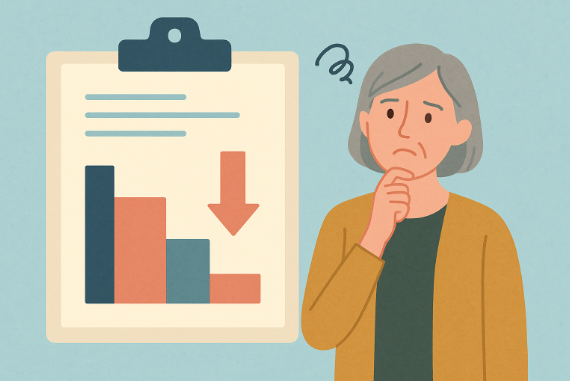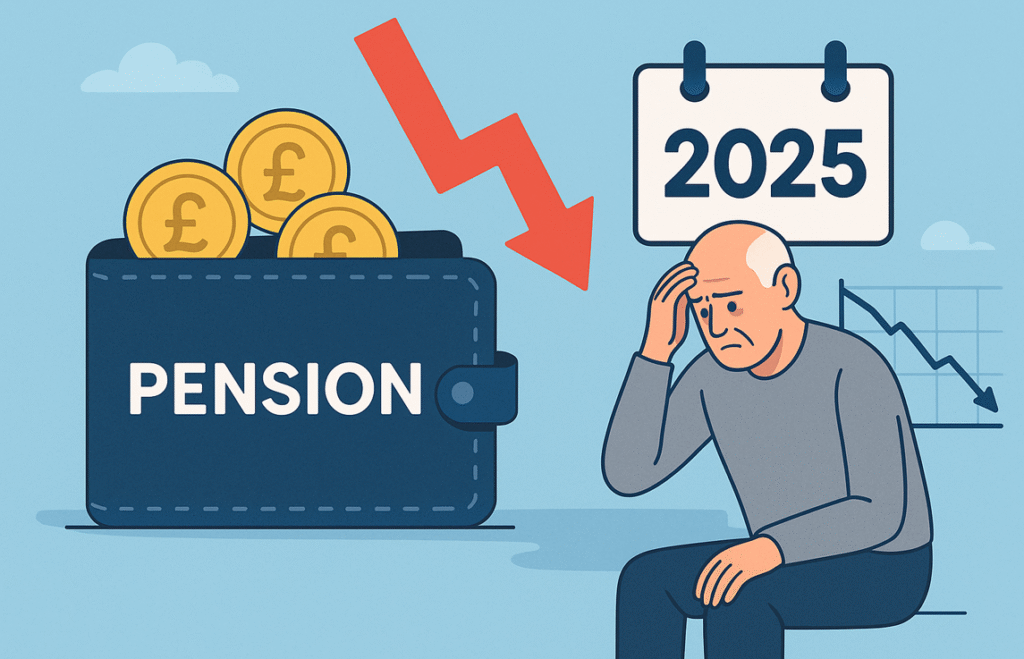The UK State Pension reduction 2025 has become a hot topic, with millions of pensioners and soon-to-be retirees concerned about how government changes will affect their retirement income. The State Pension is the backbone of retirement income for many UK citizens, yet upcoming adjustments could reduce how much people actually receive in real terms. Understanding these changes now can help you prepare for the financial impact.
What is the UK State Pension and how does it work in 2025?
What are the two types of UK State Pension?
The UK offers two main State Pension systems, depending on when you reached pension age:
-
Basic State Pension – For those who reached State Pension age before April 2016. To qualify, you need at least 30 years of National Insurance (NI) contributions. The full basic State Pension is lower than the new version, but some retirees may also receive additional payments through SERPS (State Earnings-Related Pension Scheme).
-
New State Pension – For those reaching pension age on or after April 6, 2016. To qualify for the full amount, you need 35 qualifying NI years. Anyone with fewer years gets a proportionate amount.
Both systems aim to provide a foundation of retirement income, but most people rely on extra savings, workplace pensions, or private investments to maintain living standards.
How is the State Pension age changing in 2025?
Currently, the State Pension age is 66, but it is due to rise to 67 between 2026 and 2028, and further increases are expected after that. While 2025 does not bring an immediate rise, many nearing retirement are already planning around the higher threshold. The government justifies these changes by pointing to longer life expectancy and the financial strain on public spending.
How do National Insurance contributions affect your pension entitlement?
Your State Pension is directly linked to your NI contributions:
-
35 years of full contributions = full pension
-
Between 10–34 years = partial pension
-
Fewer than 10 years = no pension entitlement
Many people choose to make voluntary NI contributions to fill in gaps, especially if they had years out of work, were self-employed, or worked abroad.
Why is there a UK State Pension reduction in 2025?

What government policies are driving the pension reduction?
The main concern in 2025 is not a direct cut to the pension but a reduction in real terms because the government is expected to adjust how the triple lock guarantee is applied. The triple lock means pensions rise by whichever is highest of:
-
Inflation (CPI)
-
Average earnings growth
-
2.5%
Due to high wage growth in 2024, the triple lock could have led to a record increase in 2025. Instead, the government is considering a modified approach, which may leave pensioners with less than they expected.
How does inflation and the cost-of-living crisis affect pension increases?
Even if pensions rise, inflation can erode the value of the increase. For example, if pensions go up by 5% but inflation rises by 7%, retirees still lose purchasing power. The ongoing energy crisis, food inflation, and rising rents have all hit pensioners hardest, since they spend a higher proportion of their income on essentials.
Is the “triple lock” guarantee still in place in 2025?
Yes, the triple lock guarantee remains in place for 2025, but the way it is applied could result in lower-than-expected increases. The triple lock means that the State Pension should rise each April by the highest of:
-
2.5%
-
Inflation (measured by the Consumer Prices Index)
-
Average earnings growth
In 2024, wage growth spiked, which should have delivered a record increase for 2025 pensions. However, the government has hinted at modifying the formula to reduce costs. This could mean using adjusted earnings data or excluding unusual wage surges. While pensioners will still see an increase, the rise may not fully match what the triple lock formula originally promised.
Sir Steve Webb, former Pensions Minister, noted:
“The government has a history of tweaking how the triple lock is calculated to save money, and that could happen again in 2025.”
Who will be affected by the UK State Pension reduction 2025?
Will current pensioners see a reduction in weekly payments?
Current pensioners may not see a direct cash cut in weekly payments, but they will face a real-terms reduction if increases fail to keep up with inflation. Essentially, while the pension may increase slightly, its purchasing power could fall.
How are people nearing retirement age impacted?
Those approaching pension age face two problems:
-
They will retire later due to the rising State Pension age.
-
They will receive a pension worth less in real terms.
This creates a “double squeeze,” meaning people must work longer and save more to maintain retirement standards.
What about UK expats and people retiring abroad?
Expat pensioners face unique issues. Those living in countries with “frozen pensions” (like Canada or Australia) do not receive annual increases. That means they’ll be stuck with 2025’s reduced real-terms rate permanently. Meanwhile, pensioners in the EU (under Brexit rules) will still get annual increases, but exchange rate fluctuations can affect their income.
How much will the UK State Pension be reduced in 2025?

What are the official government figures?
The full new State Pension in 2024 was £221.20 per week. In April 2025, it is projected to rise, but likely by less than expected if the government limits the triple lock impact. Official forecasts suggest around a 3–4% rise, despite higher earnings growth.
How much could retirees lose annually compared to 2024?
If pensions were uprated fully with wage growth, retirees might have expected over £900 more per year. With a reduced increase, they could lose £400–£600 annually in real terms compared to what the triple lock promised.
What does this mean for weekly payments?
| Year | Weekly State Pension (Full, New) | Annual Total | Real-Terms Impact |
|---|---|---|---|
| 2024 | £221.20 | £11,502 | Baseline |
| 2025 (expected) | £228.00–£230.00 | £11,856–£11,960 | £400–£600 lower than triple lock promise |
What can you do to protect your income from the State Pension reduction?
Can you boost your pension with voluntary NI contributions?
Yes. If you have gaps in your National Insurance record, you can pay voluntary contributions for previous years. As of 2025, you can backdate contributions for up to 10 years. Each extra year can add around £275 per year to your pension income, making it a worthwhile investment.
Should you consider private or workplace pensions?
Yes, private and workplace pensions are essential if you want a comfortable retirement. The UK State Pension provides only a basic level of income, which for most people is not enough to cover all living costs such as housing, bills, healthcare, and leisure.
Workplace pensions, where employers automatically enroll staff and contribute alongside employees, have become a vital supplement to the State Pension. Over time, even modest contributions can grow into a significant retirement fund.
Private pensions, such as personal pension plans or self-invested personal pensions (SIPPs), give you more flexibility to choose how and where your money is invested. These allow you to top up your retirement savings if you are self-employed, working part-time, or simply want additional security.
What are the best investment options for supplementing retirement income?
To offset reductions, retirees often look to:
-
ISAs – Tax-free savings and investment growth
-
Annuities – Guaranteed income for life
-
Drawdown pensions – Flexible access to retirement savings
-
Property income – Rental or downsizing options
How does the UK State Pension reduction compare to other countries?

How does the UK pension system rank in Europe?
The UK pension system consistently ranks among the lowest in Europe in terms of generosity. The “replacement rate” — which measures what percentage of your working income is replaced by your pension — is a useful benchmark.
-
In the UK, the State Pension replaces about 28% of average earnings.
-
By comparison, many European countries replace 50%–70% of income, with some countries offering even more through additional mandatory schemes.
Which countries offer stronger retirement support?
Countries like Denmark, the Netherlands, and Sweden provide higher pension replacement rates, often combined with mandatory private savings. These models reduce the risk of pensioner poverty and provide more stability.
Is the UK moving towards a means-tested system?
While not officially announced, there are concerns that the UK may gradually move towards a more means-tested approach. This would mean:
-
Higher earners may receive reduced pensions in the future.
-
More retirees might have to prove low income or limited assets to qualify for full benefits.
-
The system would shift further away from being a “universal entitlement.”
For now, the State Pension remains universal, but long-term financial pressures may push reforms in this direction.
What are the long-term implications of the 2025 pension reduction?
Will there be further cuts beyond 2025?
The 2025 reduction is unlikely to be a one-off. With the triple lock becoming increasingly expensive to maintain, many analysts believe it may be weakened or even replaced in the future. If this happens, pension increases could be limited to inflation only, which would slow income growth for retirees. This would mean today’s younger workers may never experience the higher rises older generations enjoyed.
How could this impact pensioner poverty levels?
Reducing the growth of the State Pension could significantly increase poverty among older people. Retirees who rely solely on the State Pension would find it increasingly difficult to cover:
-
Energy bills
-
Food and household essentials
Those without workplace pensions, savings, or property wealth would be the most vulnerable. In practical terms, many pensioners could face falling living standards year after year.
What role do government spending pressures and demographics play?
The UK’s ageing population is the biggest challenge for the pension system. More people are living longer and drawing pensions for decades, while fewer working-age people are paying taxes and National Insurance to fund them.
This creates a financial strain on the government, which faces three choices:
-
Raise taxes to fund pensions
-
Cut other public spending to protect pensions
-
Limit pension increases to keep the system affordable
Unless significant reforms are made, the State Pension system will struggle to remain sustainable while also providing adequate support to retirees.
Economist Paul Johnson from the IFS explains:
“We are in a bind – either raise taxes, cut spending elsewhere, or slow the growth of the State Pension.”
Conclusion
The UK State Pension reduction 2025 does not mean a direct cash cut, but it does mean a real-terms fall in retirement income for millions. With rising living costs, pensioners may find it harder to cover essentials. To prepare, individuals should:
-
Review their National Insurance record
-
Consider voluntary top-ups
-
Invest in private or workplace pensions
-
Explore additional income streams
While the State Pension remains a valuable safety net, relying on it alone is risky. The best strategy is to diversify retirement income and plan early for financial stability.
FAQs on UK State Pension Reduction 2025
Will my UK State Pension be reduced in 2025?
Not in cash terms, but increases may be lower than expected, meaning its real value falls.
How much will the new State Pension be in April 2025?
Forecasts suggest around £228–£230 per week, depending on government decisions.
Can the government cut the State Pension in the future?
Yes, while outright cuts are unlikely, they can adjust uprating rules, effectively reducing value.
What happens if I retire after April 2025?
You will start receiving the 2025 rate, but with the rising State Pension age, you may wait longer before you qualify.
Is the triple lock still guaranteed in 2025?
It is technically in place, but the government may adjust how it applies, reducing expected increases.

I’m Adam Milne, a business writer and co-author at UKBusinessMag.co.uk. I’m passionate about simplifying complex topics—whether it’s tax, startup strategy, or digital marketing—so that entrepreneurs can take action with confidence. With years of experience in small business consultancy, I bring a practical perspective to every piece I write, helping readers turn ideas into results.



